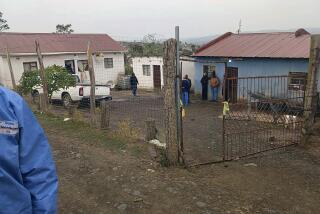S. African Parties’ Relations Hit New Low After Massacre
JOHANNESBURG, South Africa — The relationship between the white-minority government and the African National Congress, upon which the future of South Africa depends, sank to a new low Friday as each blamed the other for a township massacre of 39 black men, women and children earlier in the week.
The latest round of finger-pointing appeared to seriously jeopardize the country’s negotiations process, which has made no progress in the five weeks since the government and the ANC reached a deadlock on the mechanism for writing a new constitution.
Both the government and the ANC, under pressure from their supporters to give no more ground in negotiations, have been sniping at each other in public for weeks. But the accusations reached new highs Friday, following the bloody attack Wednesday night on homes in the township of Boipatong, south of Johannesburg.
Witnesses blamed the killings on about 200 heavily armed supporters of the Inkatha Freedom Party who charged out of single men’s dormitories near the township and opened fire on residents sleeping in their tin-and-wood shacks. Sixteen of the dead were women and eight were children.
Some residents told reporters that the attackers were transported to the township by police vehicles; a few asserted that white men with their faces painted black were among the attackers.
The ANC on Friday said it held President Frederik W. de Klerk personally responsible for the massacre, and it contended that De Klerk’s administration had, in the past three years, caused more black deaths than 40 years of apartheid. About 3,000 blacks have died in a variety of politically inspired attacks on trains, on taxis and in houses since 1989.
“The negotiations are in jeopardy,” ANC Secretary General Cyril Ramaphosa said. He added that the attack appeared to be part of a government attempt to counter an ANC campaign of countrywide demonstrations, which began peacefully Tuesday.
In the past, similar ANC protests often have spurred Inkatha supporters to violence. And the government has a long history of providing financial and emotional support for Inkatha in its rivalry with the ANC.
The Inkatha leader, Mangosuthu Gatsha Buthelezi, said he was “unutterably appalled” by the killings. And he denied that any Inkatha leader “had any knowledge whatsoever that this attack was going to take place.”
De Klerk promised that his government “will not rest until we have found the perpetrators of this shocking act and have brought them to justice.” He planned to visit the township today, marking the first visit ever by a South African president to the scene of a township massacre.
The national police force has assigned 200 officers to the case, and it conducted extensive searches of the Inkatha hostels Thursday and Friday, confiscating numerous homemade weapons.
So far, though, no arrests have been made.
Anglican Archbishop Desmond M. Tutu, the 1984 Nobel Peace Prize winner, joined other clerics Friday in a tour of the massacre scene, stopping to pray with residents in the dusty streets.
More to Read
Sign up for Essential California
The most important California stories and recommendations in your inbox every morning.
You may occasionally receive promotional content from the Los Angeles Times.











